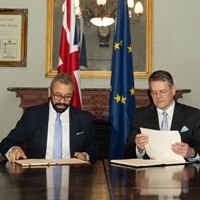(LONDON) – The EU and UK formally adopted a decision Friday laying down the arrangements relating to the Windsor Framework, the post-Brexit legal agreement on new arrangements for the Protocol on Northern Ireland.
At a meeting of the EU-UK Joint Committee in London, Commission vice-president Maros Sefcovic for the EU, and UK Foreign Secretary James Cleverly adopted the decision, which covers, amongst other things, the arrangements for the movement of goods not at risk of entering the Single Market, the “Stormont Brake”, and VAT and excise-related solutions, including the establishment of the Enhanced Coordination Mechanism for VAT and excise.
A series of Recommendations, Joint Declarations and Unilateral Declarations have also been published, clarifying how different aspects of the Windsor Framework will work in practice, e.g. State aid or market surveillance.
At the meeting, both sides also discussed the ongoing issue of citizens’ rights. They agreed on the importance of continuing to protect EU citizens and UK nationals and welcomed the efforts made over the past year to do so, including additional funding provided by both sides to external organisations. They promised to continue to work on solutions to all other relevant issues on citizens’ rights.
In the tenth Partnership Council today, the EU and the UK reaffirmed their desire to ‘exploit fully the potential of the Trade and Cooperation Agreement (TCA) in ways that benefit both parties’. The two co-chairs discussed cooperation in a range of crucial areas, including energy, trade and security. They say they will remain in regular contact and will meet again to take stock of the work of the Committees under the TCA.
Following the signing, the decision and recommendations will enter into force tomorrow, 25 March. Certain parts will become applicable in a gradual way. For example, the new and expanded trusted trader scheme for freight will start applying on 30 September 2023, provided that the relevant safeguards are in place.
In order to fully implement the range of joint solutions announced in Windsor, the Commission tabled on 27 February three legislative proposals on sanitary and phytosanitary (SPS) rules, medicines and Tariff Rate Quotas (TRQs). The EU executive says it is working closely with the European Parliament and the Council for their swift adoption over the coming months.
The EU and the UK commit to “work closely together, in good faith, to ensure the full implementation of the Windsor Framework, including the full implementation of safeguards and facilitations”.
Political agreement in principle on the Windsor Framework was reached on 27 February. It is a political declaration which includes joint solutions across different areas: governance, customs, agri-food products, VAT and excise, State aid, medicines and TRQs. EU Member States unanimously agreed to the Windsor Framework at the General Affairs Council on 21 March 2023.
These new arrangements have been carried out within the framework of the Withdrawal Agreement of which the Protocol on Ireland/Northern Ireland is an integral part. Within these pre-established legal parameters, a number of targeted amendments to the Protocol address, in a definitive manner, unforeseen challenges that have emerged since the start of the implementation of the Protocol.



